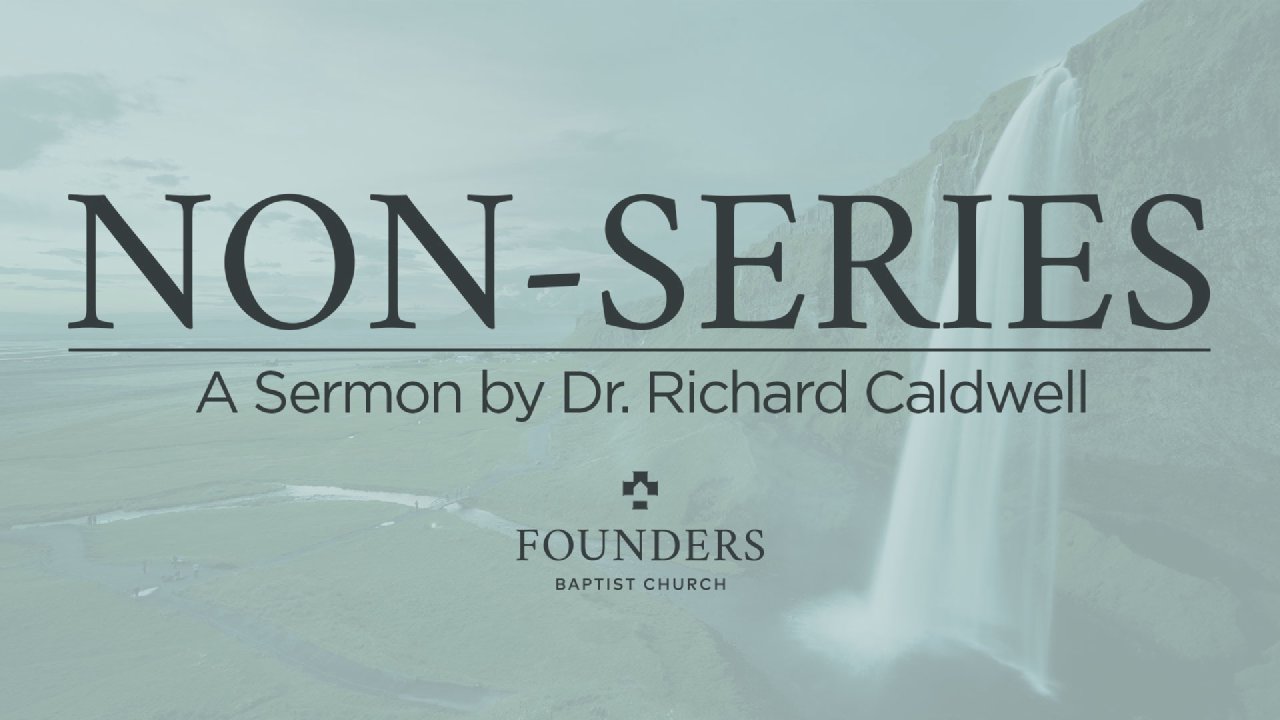Introduction:
How does the local church experience the unity that is already ours in Jesus Christ? We ARE one in Jesus Christ, but how do we experience the JOY AND PEACE of that oneness?
THIS IS SOMETHING WE SHOULD GREATLY DESIRE.
Psalm 133 gives voice to the joy of it.
ESV Psalm 133:1 A Song of Ascents. Of David. Behold, how good and pleasant it is when brothers dwell in unity! 2 It is like the precious oil on the head, running down on the beard, on the beard of Aaron, running down on the collar of his robes! 3 It is like the dew of Hermon, which falls on the mountains of Zion! For there the LORD has commanded the blessing, life forevermore.
We have seen that the pursuit of unity exists on a foundation larger than unity. We strive to maintain unity as part OF A LARGER PURSUIT.
What is that larger pursuit?
IT IS A LIFE THAT MATCHES WITH GOD’S MERCY TO US (vs.1).
Paul is a living example of a life fully devoted to the one who died for us and gave us life.
Paul is a loving example of someone wanting those whom he loves to live the life that matches their calling.
AND THAT LIFE IS THE PRODUCT OF INTERNAL GRACES.
The Christian life is lived from the inside out.
Holy activity is the result of holy attitudes.
Review:
We looked last Lord’s Day evening at the first of 5 attitudes (focal points for internal desire and devotion) necessary to a worthy walk.
I. THE WORTHY WALK IS A HUMBLE WALK
II. THE WORTHY WALK IS A GENTLE WALK
Tonight, we begin with the 3rd.
Lesson:
III. THE WORTHY WALK IS A PATIENT WALK
We mentioned at the beginning of this study that these qualities have telescopic character about them. Humility is the spring source of the others, and each one contributes to the next.
It is the humble person who demonstrates gentleness. It is a humble and gentle person who is CHARACTERIZED by PATIENCE.
A few things we should note here.
A. THERE IS A KIND OF PATIENCE THAT SPEAKS OF SALVATION
The fact that Paul could mention patience as a mark of living in a way worthy of our calling, says that this is not a natural kind of patience.
There is a kind of patience that can be natural to people. There are lost people that others would characterize as patient.
THERE IS A KIND OF PATIENCE THAT REFLECTS INDIFFERENCE
THERE IS A KIND OF PATIENCE THAT REFLECTS RESIGNATION
THERE IS A KIND OF PATIENCE THAT REFLECTS SELFISHNESS
It is easier to NOT RESPOND.
It is easier to PUT UP WITH SOMETHING.
It is easier to ACCEPT MY CIRCUMSTANCES.
THERE IS A KIND OF PATIENCE THAT MERELY REFLECTS PERSONALITY
None of that is what Paul is talking about.
So, WHAT KIND OF PATIENCE DOES SPEAK OF SALVATION?
1. THE PATIENCE THAT SPEAKS OF SALVATION IS EXPLAINED BY FAITH
The word in our text is a form of the word μακροθυμία
The word group is used to describe several notable qualities. But something that we see about these qualities is that they operate in the realm of KNOWLEDGE.
A key text for understanding patience is Colossians 1:9-12.
ESV Colossians 1:9 And so, from the day we heard, we have not ceased to pray for you, asking that you may be filled with the knowledge of his will in all spiritual wisdom and understanding, 10 so as to walk in a manner worthy of the Lord, fully pleasing to him: bearing fruit in every good work and increasing in the knowledge of God; 11 being strengthened with all power, according to his glorious might, for all endurance and patience with joy; 12 giving thanks to the Father, who has qualified you to share in the inheritance of the saints in light.
2. THE PATIENCE THAT SPEAKS OF SALVATION IS EXPLAINED BY GOD’S POWER
That same text makes clear that the patience spoken of is made possible by divine power (vs.11).
3. THE PATIENCE THAT SPEAKS OF SALVATION IS STURDY
Endurance is joined at the hip with patience (vs.11).
“I’ve been patient long enough” is the kind of thing that ANY HUMAN BEING CAN SAY.
But the Christian must be asked, “HAVE YOU BEEN PATIENT FOR AS LONG AS WOULD BE NECESSARY TO PLEASE GOD?”
Do you want to be?
Do you know that by the power of God, you CAN BE?
4. THE PATIENCE THAT SPEAKS OF SALVATION EXISTS WITH JOY AND GRATEFULNESS
It is accompanied by joy and thanksgiving.
Sometimes it is true to say that it is FUELED by joy and thanksgiving.
“The joy of the Lord is your strength.” (Nehemiah 8:10)
It is not stoic resignation, and it is certainly not a GRUMBLING resignation (vs.11-12)
5. THE PATIENCE THAT SPEAKS OF SALVATION EXISTS IN THE REALM OF PRODUCTIVITY AND GROWTH (vs.10)
It is not sitting around in a state of being spiritually “stuck.” In this same life where endurance and patience are exhibited with joy and thanksgiving, THERE IS FRUITFULNESS IN EVERY GOOD WORK. The knowledge that fuels patience is INCREASED by our fellowship with God in the circumstances that REQUIRE PATIENCE.
God is taking us to school even as He strengthens us to stay in the classroom.
6. THE PATIENCE THAT SPEAKS OF SALVATION IS THE PERSONAL WORK OF THE HOLY SPIRIT
ESV Galatians 5:22 But the fruit of the Spirit is love, joy, peace, patience, kindness, goodness, faithfulness,
So what is it? What is it that exists in knowledge and is explained by faith? What is it that is supernatural in all the ways we’ve talked about?
The standard Greek lexicon (BDAG) offers the following:
① state of remaining tranquil while awaiting an outcome, patience, steadfastness, endurance Col 1:11; 2Ti 3:10. διὰ πίστεως καὶ μακροθυμίας through faith and steadfastness Hb 6:12. ὑπόδειγμα τ. κακοπαθίας κ. τ. μακροθυμίας Js 5:10. W. ταπεινοφροσύνη Hs 8, 7, 6; cp. 9, 15, 2.
② state of being able to bear up under provocation, forbearance, patience toward others (Artem. 2, 25 p. 119, 10)
ⓐ of human beings (Pr 25:15; Sir 5:11; TestJos 17:2) w. other virtues 2 Cor 6:6; Gal 5:22; 1 Cl 62:2. W. ἐπιείκεια (cp. EpArist 188) 1 Cl 13:1. W. πραΰτης Col 3:12. W. ἐγκράτεια 2:2. ἐν p 613 πάσῃ μακροθυμίᾳ 2 Ti 4:2. In contrast to ὀξυχολία: Hm 5, 1, 3 and 6; 5, 2, 3 and 8. μετὰ μακροθυμίας ἀνεχόμενοι ἀλλήλων Eph 4:2.
ⓑ of transcendent beings
α. of God (ApcEsdr 2:8; Did., Gen. 186, 10 [restored]) Ro 2:4; 9:22; 1 Pt 3:20; IEph 11:1.
β. of Christ 1 Ti 1:16; 2 Pt 3:15.—S. ὑπομονή 1, end.—DELG s.v. θυμός. M-M. EDNT. TW.[1]
μακροθυμία, ας, ἡ as a state of emotional quietness in the face of unfavorable circumstances patience, long-suffering; (1) as patience under trial endurance, steadfastness (HE 6.12); (2) as constraint exercised toward others forbearance, patience (2C 6.6); (3) as God's constraint of his wrath long-suffering, forbearance (RO 2.4)[2]
[1] William Arndt et al., A Greek-English Lexicon of the New Testament and Other Early Christian Literature (Chicago: University of Chicago Press, 2000), 612–613.
[2] Friberg, Analytical Greek Lexicon





